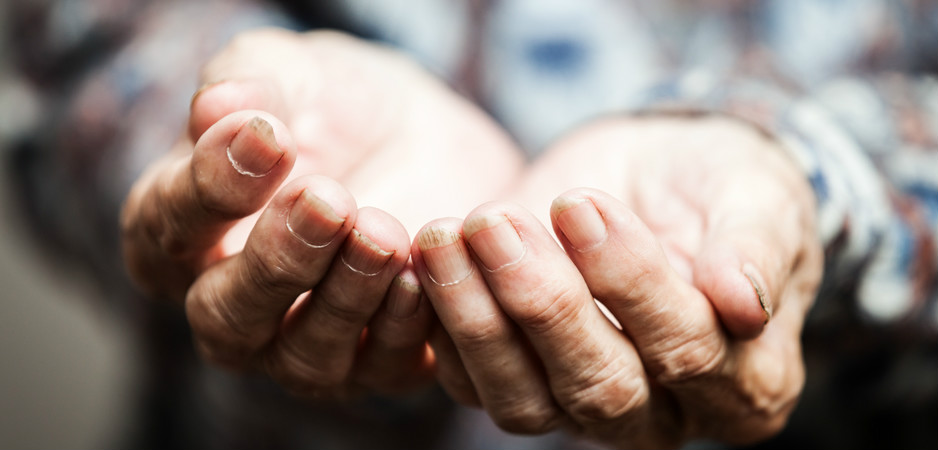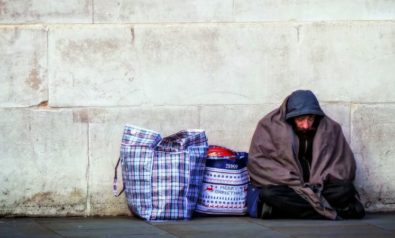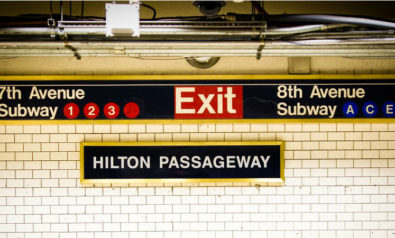Rights-based approaches tackle the stigma of homelessness by making those who are homeless rights-holders, rather than recipients of charity.
Policy responses to homelessness differ greatly between countries. Who is defined as homeless varies from narrow definitions that include only the “literally roofless” to wide definitions that include those living in overcrowded, insecure, unsafe or very poor quality housing. The balance of responsibility for responding to homelessness between state institutions and voluntary and “faith based” organizations differs also.
Another key difference is whether responses to homelessness are “housing-led” or not, that is, whether they emphasize immediate access to settled housing or – as was most common until recently – require homeless people to make their way up a “staircase” of support before they are considered “ready” for normal housing. A further, and crucial difference, is whether or not homeless people have a legal right to accommodation.
Right to Housing
It’s often said that people have a “right to housing,” and what tends to be meant by this is that housing is seen as a “human right,” something that everybody ought to have access to and needs to have a decent quality of life. Having a legal right to housing means something different, and very specific. It means that by law, a specific agency (most often a municipalities’ housing or social welfare department) has a duty to provide individuals with accommodation and that domestic courts can enforce that legal duty when it is not acted upon.
It’s worth dwelling on the difference such rights make to an individual homeless person’s experience of seeking help. In most major cities in Europe, a range of homelessness services exist, that provide food, shelter and others forms of assistance. Often these services will benefit from state funding. Nevertheless, where no legal rights to housing exist, no organization has a legally enforceable responsibility to secure accommodation for any individual homeless person. In this sense, where there are no legal rights of this kind, access to housing for those who are homeless is at the discretion of specific organizations and providers.
The cost of legally guaranteeing access to housing – an expensive and often scarce resource – is likely to be substantial, and thus the demand for such rights is often seen as unrealistic.
Given that housing is commonly viewed as a “human right,” it is perhaps surprising that legal rights to accommodation for those who are homeless are unusual. In some countries those who are “roofless” are entitled to emergency shelter under police or social welfare law. This is the case in Germany, Sweden, Poland, Hungary and the single US jurisdiction of New York City, though in Sweden the right is conditional on the homeless person meeting requirements to attend meetings, stay sober and look for work.
The legal rights that pertain in these countries are limited in two ways. First, only a narrow group of people who would otherwise be sleeping on the streets have this legal entitlement, rather than a broader group who are homeless according to a wider definition. Second, they entitle this narrowly defined group to emergency accommodation only – often of a poor quality and in an institutional and dormitory setting – rather than to settled mainstream housing. Legal rights to housing that are more generous in these ways are very rare indeed, with the only clear examples being in the UK and France.
Legal Rights
Legislation establishing a legal right to settled housing for homeless people was passed in Great Britain in 1977. It specified that only certain categories of homeless people were entitled to rehousing, though it was not rough sleepers that were prioritized, but households including children, a pregnant woman or someone specifically defined as “vulnerable.” Sleeping on the streets was not in and of itself sufficient to qualify someone as vulnerable, and so many “literally roofless” people were not entitled to rehousing under the act.
Since then, the devolution of relevant legislative powers to Wales, Scotland and Northern Ireland have led to increasingly divergent approaches, particularly between Scotland and England. Though reforms in England have been interpreted as weakening the statutory safety net for homelesspeople, reforms in Scotland have been in the other direction, with legal entitlements to temporary accommodation and settled housing now extended to virtually all homeless people, on a wide definition that includes rough sleepers and those in unsafe or unsuitable accommodation.
The French enforceable right to housing (or DALO) was established much more recently, in 2007. Media pressure prompted by a campaign led by the voluntary organization Les Enfants de Don Quichotte was widely seen to have forced a government response. The French act entitles people in a variety of situations to housing. This includes French citizens and those legally residing in France who are threatened with eviction, staying with someone but with no home of their own, who have been living in a hostel for more than six months and who are living in substandard, dangerous or overcrowded premises.
The case in favor of legal rights-based approaches to homelessness seems clear. They offer to better meet the housing needs of those with entitlements, as access to housing is enshrined in law, rather than determined by the discretion of an organization or service provider. Because of this, legal rights also offer to empower those who are homeless, enabling them to demand something of the state from a position of poverty and disadvantage. And because of this, legal rights are seen to tackle the stigma of homelessness by making those who are homeless rights-holders, rather than recipients of charity.
Are the gains of being “empowered” by legal rights greater than the risk of being seen as group that unfairly benefits compared to non-homeless people who must struggle to access housing on their own?
That so few countries have established legal rights of this kind indicates that the case for them has not been won. There are several reasons why the jury remains out on legal rights-based responses to homelessness. For one thing, establishing such rights may prove prohibitively costly and lead to unintended consequences. The cost of legally guaranteeing access to housing – an expensive and often scarce resource – is likely to be substantial, and thus the demand for such rights is often seen as unrealistic. In addition, establishing a legal right may in fact direct resources away from homelessness, and into legal battles challenging responsible organizations that fail to meet their legal duties.
It has also been argued that such rights create a “perverse incentive” for people to fabricate situations of homelessness to benefit from these entitlements, and that instead of reducing stigma, may fuel negative public attitudes toward those who are homeless by giving them access to a competitive resource they were unable to secure for themselves.
Choosing Sides
Choosing a side in the debate for and against legal rights-based approaches to homelessness would be far easier in the context of evidence demonstrating that the benefits of such approaches outweigh the costs, but as is so often the case, such evidence is sparse. My own research has sought to fill this vacuum in our understanding in some small way.
My work compared the experiences of single homeless men in Scotland – where they benefit from a legal right to settled housing – and Ireland – where they do not. Despite this key difference, improving responses to homelessness has been a major focus in both countries for some time, with substantial resources directed to improving services under a “housing-led” strategy seeking to ensure swift access to settled housing for those experiencing homelessness. In Ireland, these efforts have taken place in the absence of any legal entitlement being established, with such legalistic approaches seen to be costly, adversarial and, most importantly, unnecessary to achieving better outcomes for homeless people.
Comparing the experiences of homeless men in Edinburgh and Dublin revealed the very stark difference legal rights make, even when national policy is focused on achieving the same aim, i.e. meeting homeless people’s need for settled accommodation. In Edinburgh, the Scottish legal framework enforced a clear and blunt focus on ensuring that those who were homeless first gained access to immediate shelter and, subsequently, settled housing. Though people often had to wait for such housing to become available in temporary accommodation, their route through homelessness services and temporary shelter was much shorter and easier than in Dublin.
To understand why, it’s important to emphasize that enabling homeless people to access settled housing is only one of a number of potential objectives that homelessness policies and organizations working with homeless people may be pursuing. Other priorities might include seeking to change the behavior of those who are homeless (to address substance use issues for instance); rewarding those who are seen to be deserving of rehousing, because they’re ready to “settle down” or don’t have a criminal conviction; and ensuring that areas in which those who are homeless might be housed remain “socially mixed” rather than saturated with poor households.
The question we are left with is how often the system is manipulated in this way and whether the costs of this manipulation (both financial and in terms of fairness) are so great as to undermine the legitimacy of the entire model.
On the flip side, people might be also be keen to avoid rehousing homeless households in affluent areas in case local residents object to people with potentially complex needs moving into their neighborhood.
These different objectives are highly likely to come into conflict. The attempt to avoid the concentration of poorer people in particular areas often results in the exclusion of homeless people, often from the most affordable areas. Similarly, the exclusion of “less deserving” groups – those with criminal records and substance use issues, for instance – further marginalizes an often already disadvantaged group.
When homeless people do not have a legal right to housing, these other – often quite reasonable – concerns are able to play a big role in determining who accesses housing, and this is what we see in Ireland. In comparison, the Scottish system bluntly forces service providers to focus on ensuring access to settled housing. Not only that, it also empowers homeless people: Reflecting the legal reality of their situation, homeless men in Scotland felt entitled to support, rather than grateful for it, as those in Ireland often did. Moreover, this sense of entitlement was seen as both morally legitimate and as one factor helping ensure good standards of service delivery by those working in the sector.
Whether overall legal rights reduce the stigma of being homeless is still not clear: Are the gains of being “empowered” by legal rights greater than the risk of being seen as group that unfairly benefits compared to non-homeless people who must struggle to access housing on their own?
Nor is it yet clear how cost rights-based approaches to homelessness are. Scotland’s large social housing sector (around a quarter of Scotland’s housing stock) is clearly an asset in being able to pursue this kind of approach, and in spite of this resource, the cost of temporarily accommodating homeless people before they can access settled housing has increased dramatically. Such costs have recently prevented Wales introducing a rights-based model as radical as Scotland’s.
A Positive Note
On a more positive note, the fear the legal rights lead to constant and costly legal battles has not borne out in Scotland, where legal challenges are very rare in the context of a wide consensus in favor the entitlements owed to homeless people. It is the case, however, that such legal rights create an incentive for people to claim they are homeless in order to benefit from these entitlements. This parallels the charge that unemployment benefits undermine work incentives, and it is certainly the case that any policy that targets resources at those most in need may encourage people to take advantage of that system when they don’t really need to.
The question we are left with is how often the system is manipulated in this way and whether the costs of this manipulation (both financial and in terms of fairness) are so great as to undermine the legitimacy of the entire model. The consensus among those working in the homelessness sector in Scotland is that the costs are minimal and the legitimacy of the approach maintained, though it is also the case that this line of argument informs resistance to legal rights of this kind in Ireland.
Legal rights to housing for homeless households are not a cure all. New York City and Hungary have both come under attack recently for their responses to homelessness, despite the existence of legal rights to shelter in both. In England – the “home” of legal rights to settled housing – we are seeing a gradual erosion of the legal safety net in the face of the very limited supply of social housing in some areas and a package of welfare reforms that are weakening welfare support for the most vulnerable. Nevertheless, the Scottish model – notably for it’s simplicity and clarity in comparison to other rights-based approaches – does appear to offer a way of ensuring that homeless people can access settled mainstream housing.
The views expressed in this article are the author’s own and do not necessarily reflect Fair Observer’s editorial policy.
Support Fair Observer
We rely on your support for our independence, diversity and quality.
For more than 10 years, Fair Observer has been free, fair and independent. No billionaire owns us, no advertisers control us. We are a reader-supported nonprofit. Unlike many other publications, we keep our content free for readers regardless of where they live or whether they can afford to pay. We have no paywalls and no ads.
In the post-truth era of fake news, echo chambers and filter bubbles, we publish a plurality of perspectives from around the world. Anyone can publish with us, but everyone goes through a rigorous editorial process. So, you get fact-checked, well-reasoned content instead of noise.
We publish 2,500+ voices from 90+ countries. We also conduct education and training programs
on subjects ranging from digital media and journalism to writing and critical thinking. This
doesn’t come cheap. Servers, editors, trainers and web developers cost
money.
Please consider supporting us on a regular basis as a recurring donor or a
sustaining member.
Will you support FO’s journalism?
We rely on your support for our independence, diversity and quality.














Comment